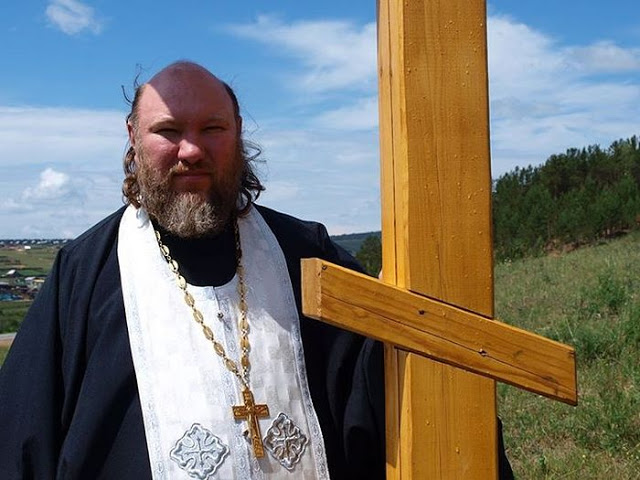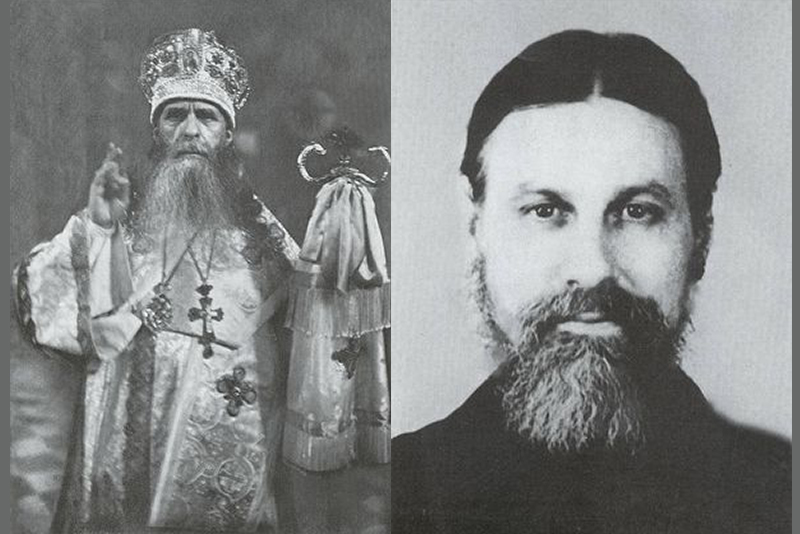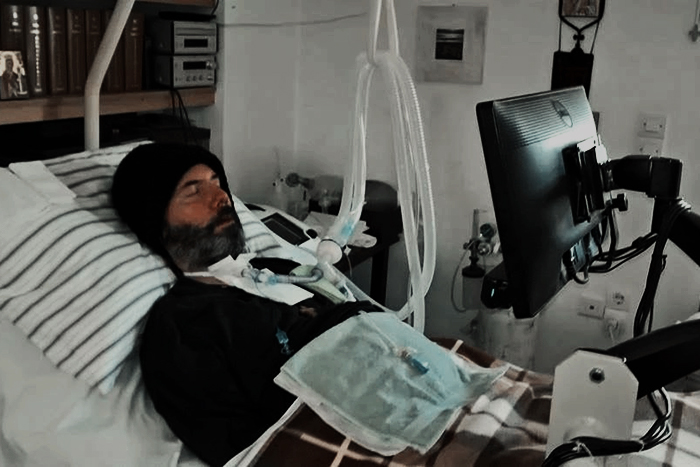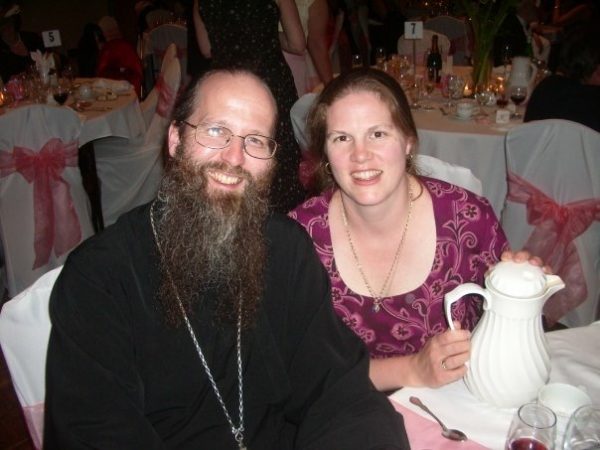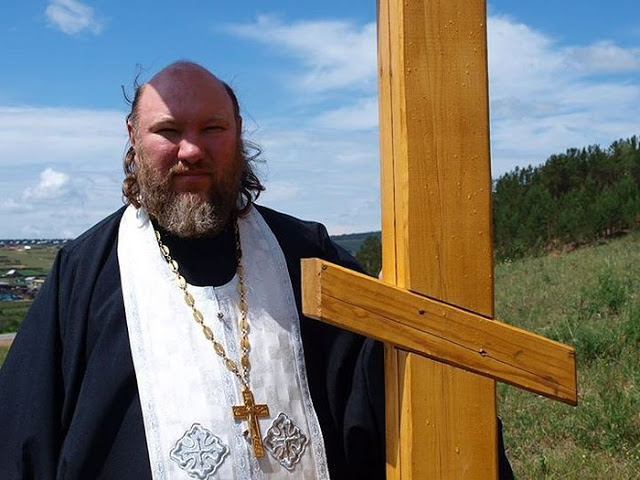
In 2009, the well-known Russian Protestant pastor Igor Zyryanov converted to Orthodoxy along with his entire community of neo-Pentecostals. Today Fr. Igor is the rector of the Holy Trinity Church in the village of Ust-Ordynsky in Irkutsk Province, dean of the Ust-Ordynsky region, director of the St. John Chrysostom “The Way Home” diocesan center. We spoke with Fr. Igor about his discoveries in Orthodoxy, as well as about the best way to speak with Protestants about the true faith.
—Father, it’s been four years since you were ordained a priest, and six since you became Orthodox. Tell us in a few words, what has changed for you from the time you were a Protestant?
—The main thing is that the exalted dreams and hopes I had in the past as a Protestant are now coming true. I hoped to become a missionary, I wanted to preach the Gospel to the multitudes. Now I have an enormous opportunity for this. I can labor for God full strength, from morning to evening, as much as my strength allows.
—What obstacles were there to this in your Protestant past?
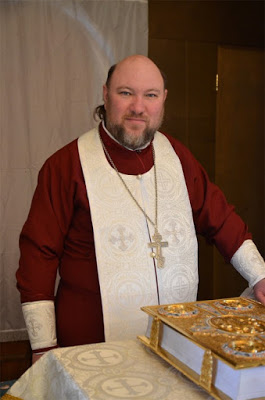 —First of all, the absence of the fullness of the faith and God’s grace. Protestants have good intentions, but no strength for real action, which is something the Lord gives us through His Sacraments. For example, the Protestants have the “act” of repentance but not the Sacrament of confession, thanks to which human sin is healed, and the believer is freed from sin’s power. But most importantly the Protestants do not have the Sacrament of Communion, without which any inner transformation is basically impossible.
—First of all, the absence of the fullness of the faith and God’s grace. Protestants have good intentions, but no strength for real action, which is something the Lord gives us through His Sacraments. For example, the Protestants have the “act” of repentance but not the Sacrament of confession, thanks to which human sin is healed, and the believer is freed from sin’s power. But most importantly the Protestants do not have the Sacrament of Communion, without which any inner transformation is basically impossible.The second obstacle that hindered us from preaching to the masses is the cultural barrier [in Russia]. Our country is historically Orthodox and Protestant preaching is perceived by it people as something foreign, like an attempt at recruitment to some foreign cause. In talking about Jesus Christ as Protestants, we literally ran after people. We spent a huge amount of time and strength on one person, thought up various projects and programs. Nevertheless, we were always perceived inadequately.
Now it isthe opposite. People are thirsting to talk with an Orthodox priest. No matter where a batiushka goes, there are always people around who want to talk with him, to ask him questions and make requests. Therefore it is easy for us to talk about faith in God, to bring them into the church, and help them in a real way. That is what we do, with God’s help.
—Fr. Igor, is there anything in Orthodoxy that turned out to be not what you expected?
—I did not experience any disappointments. It all turned out to be exactly as I imagined it to be at the beginning of my journey. Even more—I now see many aspects of Orthodoxy more deeply and seriously than I once thought, especially those of prayer, fasting, and personal human piety. I well remember the time when I had just begun to read morning and evening prayers. I prayed with great pleasure; the rich content and spiritual fullness of the prayers amazed me. I still immerse myself in that process like in an ocean. Now I read what the holy fathers wrote about the Jesus prayer. It is extremely interesting.
—When you became Orthodox, were you sure that the priesthood was prepared for you?
—I admit that I thought about this. But that was not crucial. Having understood that truth is in Orthodoxy, I was inwardly ready to become an ordinary parishioner. To me it was important to be in Christ’s Church. The capacity was not important. It seemed that everything pointed to me being a simple believer. But then I and two other of our brothers, former Protestants, were invited to receive the priesthood.
I suspect that this is an important moment that every Protestant who is thinking about converting to Orthodoxy should know. Active ministers who are used to preaching, to taking care of people, will definitely find their way of service in the Orthodox Church; this is possible. The harvest is great… But at the same time, a former Protestant should be inwardly ready to become an ordinary church-going layman. It is all in God’s hands.
—Fr. Igor, what did you unexpectedly discover in yourself when you became Orthodox?
—When I was a Protestant, I was sure that I was holy. I simply confessed the sins I had committed and went on—leading the so-called “life in triumph”. When I became Orthodox, I saw my true face. I understood that I am hypocritical, proud, deceitful, ambitious, and so on… This made me disappointed in both myself and in Protestantism in general as a teaching. In Orthodoxy I obtained a serious support, help from God in being freed from my sins—through the Sacrament of confession and Communion. The longer I am Orthodox, the more I see the corruption of my own nature. But this knowledge gives me a reason to humble myself even more before God, to seek His face, and to try to change.
—Father, an article in Orthodox media about the conversion of your community to the Russian Orthodox Church evoked broad discussion. Even the secular media published this news about you. What was the aim of publishing this?
—I by no means made the story of our parish known out of thirst for glory. The thing is that before I became Orthodox I headed the international mission called, “Every Nation”, which preached the Gospel to the native peoples of Siberia and the Far East. I had many helpers in this mission from Protestant communities in Russia, Belarus, Ukraine, and Kazakhstan. I had to explain to everyone who knew me personally and distantly the reasons for my decision and the reasons why I could not continue serving as I did.
That is how the story of our conversion arose. By the way, this story is still relevant; many Protestants still read it, and they later write and call me. The majority of those who ask questions about Orthodoxy are citizens of Russia and Ukraine, but there are also Protestants who want to become Orthodox among them from Europe, Israel, and the U.S. I receive many letters, and I can’t even answer them all.
—At the blessing of Metropolitan Vadim of Irkutsk and Angarsk, a consultation center called “The Way Home” has been organized in your diocese in honor of St. John Chrysostom. Thanks to this center, 200 Protestants have already become Orthodox…
—I can’t say that these 200 people are entirely the fruit of our center’s work. In order for a person to find the true faith many conditions are needed, which are first and foremost created by the Lord Himself. A small part of this work, by God’s grace, is ours. Many Protestants come to me, mainly ministers. There are those to want to meet and talk secretly. We go to meet with them, answer their questions, and tell them about our own experience.
By the way, we now have two former pastors from a charismatic movement who serve in the altar of our church. And in Irkutsk province today there are six priests serving (including myself) who are former Protestants.
It must be said that the flood of people converting to Orthodoxy could be even larger. We are seeing how in other countries whole communities are converting to Orthodoxy, while in Russia we are not seeing such mass conversions from Protestantism.
—Why is that?
—There are several reasons. Often priests who bring Protestants into Orthodoxy are in a hurry. They relate to Protestantism as to an enemy movement, and try to yank a person out of it abruptly. This is not always beneficial. For example, if a pastor starts thinking about Orthodoxy, the whole community may become Orthodox. But the priest to whom the leader has turned tries to convince him to receive Orthodoxy quickly. The pastor follows his advice, becomes Orthodox, and… looses his authority among his parishioners who have not had the chance to understand anything yet. The leader is kicked out of the congregations, and the parish receives a vaccination against Orthodoxy.
In our case, thank God, this did not happen. Fr. Viacheslav Pushkarev, the head of the missionary department of the Irkutsk diocese, was in no rush when he began to meet with us. He came to our meetings with lectures, allowed the whole community to understand Orthodoxy, to literally be permeated with it. Therefore we were all able to come into the Russian Orthodox Church, and we didn’t lose anyone.
Clergy who are involved in missionary activities in a Protestant milieu should make contact with pastors who are open to having contact. It is helpful to tell them about the faith, to suggest some patristic reading. In this case the whole community will have the opportunity to understand the beauty of Orthodoxy, to know what the Church is. I think that after this the majority of the members of the congregation will receive Orthodoxy. There simply can be no other outcome for a Protestant who sincerely seeks God. Having learned the facts about the Orthodox Church, about the Sacraments, about apostolic succession, a person simply cannot remain a Protestant.
—And what about debates with Protestants, which were popular at one time?
—I think that this format is untenable. Let’s say we have a public debate and we win, while the Protestant leader loses. He is humiliated and insulted, and it’s highly unlikely that he’ll become Orthodox. If the Orthodox side didn’t have sufficient knowledge or good enough arguments and lost the debate, he has brought shame upon Orthodoxy. In both cases we have a fiasco.
In our work we strive to be guided by the words of St. Gregory the Theologian: “We are trying to achieve not victories, but the return of our brothers, as our separation from them torments us.”
As long as the hearts of Orthodox people are not in fact tormented by their separation from Protestants, any service to them will be unsuccessful.
If we are talking about our own personal relationships with Protestants, the Orthodox should refuse to participate in any aggressive polemics. We should gently talk about our own spiritual experience, share our experiences. We should simply sincerely show that there is something in Orthodoxy that can help our brother: the grace of God, which is almost entirely absent in Protestant congregations.
—What questions do Protestants ask when they come to you?
—First of all the ones that lie on the surface. We all know this set of questions: about icons, the veneration of relics and saints. But in fact it’s not important what questions they bring to us. We have to answer the questions, but the main thing is to bring the understanding to the Protestants about what the true Church is. We observe with regret that there are people who have become Orthodox but have become only nominal Christians. This has happened because they have not decided for themselves just what the Church is.
It is no secret that in church we can run into problems, temptations and difficulties, and the negative behavior of parishioners. But if a person has a foundation—the awareness that the Church is the ship of salvation, and its captain is Jesus Christ Himself—he will not leave when he encounters these problems in the churches. Glory be to God that I ended up on this ship, that our Lord Jesus Christ pulled me into it. And that I no longer have to try and traverse the sea on the flimsy little boat of Protestantism. I don’t care if a small board on the ship has rotted, or that there is a slight tear on the fringe of the sail, because most important is the ship’s Captain. If you understand this you are protected from temptations and problems. But if you don’t have this understanding, then all the rest—neither the beauty of Orthodoxy, nor the asceticism, nor freedom from the passions, nor prayer, the grandeur of the services and the power of Communion can keep a person in the church.
There are also examples of the opposite, when a person understands the value of the Orthodox faith and does not pay any attention to the problems.
One woman, a third generation Baptist, started thinking about Orthodoxy, came to a church and asked the grandma at the candle desk if she could speak with a priest. The grandma said, “Are you even baptized?” The woman answered that she wasn’t. The old lady told the woman off, saying that batiushka would not even talk to her in that case. The woman did not give up after one try, and wrote to our center. Finally she met with a priest in another church. And this is not an isolated incident, unfortunately. There have been cases where Protestants were ready to receive Orthodoxy, came to a priest and asked for help. In one case the priest insulted the person, in another case the priest sent him to the bishop. Happily these Protestants did not give up and became Orthodox nonetheless. Possibly this treatment was a test of their resolve. But it doesn’t at all mean that the actions of those representatives of Orthodoxy whom I just mentioned were right.
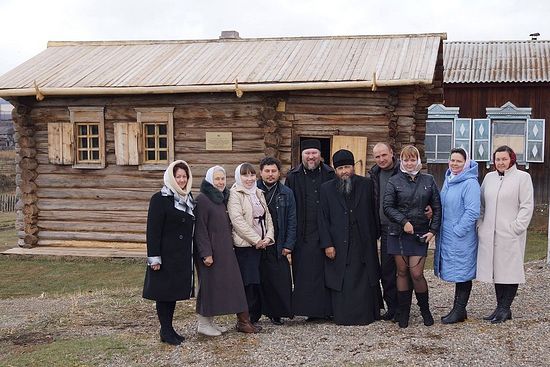
—You have already partially answered my next question about what the Orthodox Church should do so that the Protestants would come to it.
—Actually, we do not have to change anything; essentially we have everything. There are meaningful, clear, and profound answers in the Orthodox Church to the questions that Protestants have. It is only a matter of good relationships to Protestants and the knowledge of those who receive Protestants, to see the problems with which a Protestant has come.
Perhaps the very least would be to organize more centers like ours. We have already shared our experience with the Tomsk diocese, and are ready to visit other regions if we are invited.

